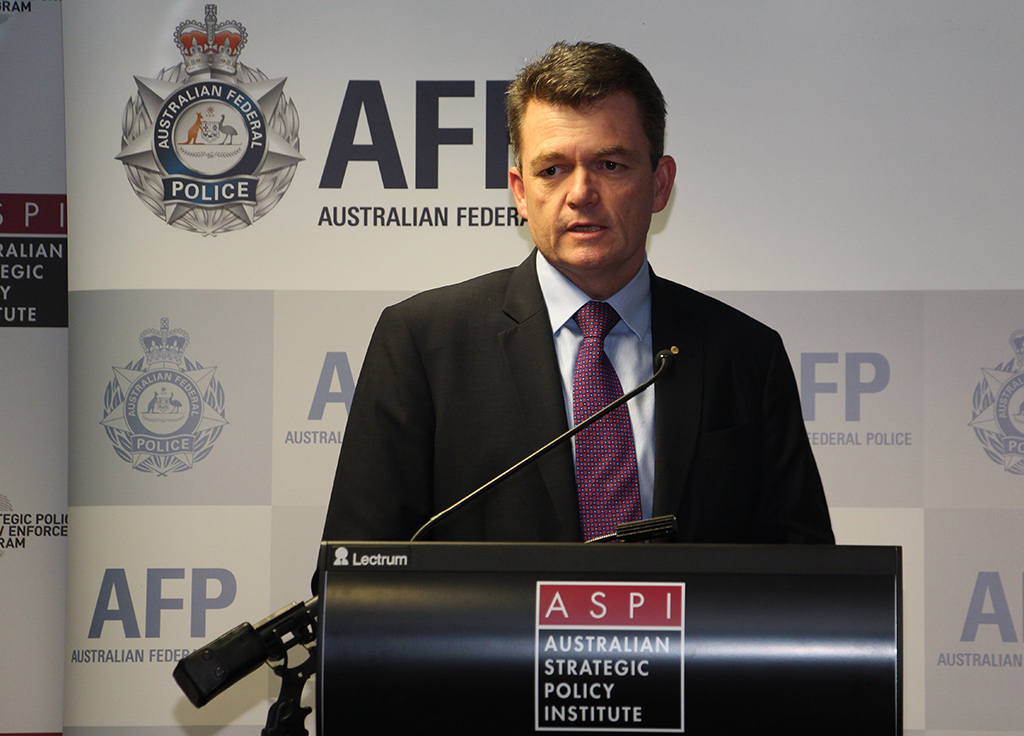
Andrew Colvin had two key concerns when the prospect of a new department of home affairs first emerged. ‘A Home Affairs portfolio makes a lot of sense in this country’, the Australian Federal Police commissioner tells
The Strategist. ‘I believed that anything that saw the AFP and the Border Force better aligned under the same ministerial and departmental arrangement was a good thing. I’d always been against Customs being moved out of the portfolio. That was a logical partnership and we needed to be together’, Colvin says.
‘The only other thing that worried me was the need to maintain statutory independence. As long as the independence of the office of the commissioner to make decisions is unfettered, then that’s a good thing.’
Malcolm Turnbull settled that question with his announcement that the new portfolio would be more like the British model than the American one—a ‘federation … of border and security agencies’ under which the various agencies would retain their statutory independence.
‘All I needed to make sure was that statutorily I maintained the independence of the agency to make the decisions we need to make on behalf of the community’, Colvin says. ‘Again, it’s a bit like the frog in the water. Things are getting hotter and hotter and we need to come together better. It’s not that we weren’t cooperating—we’re cooperating very strongly. Our relationship with ASIO is as good as it’s ever been because it has to be. Bringing us together gives us a force multiplier, allows us to trade off each other’s capabilities better and to develop capabilities better.
‘We see all the upside to Home Affairs. I’m very pleased that it will cement the AFP at the centre of our national security arrangements, with a senior minister. I’m pleased that it aligns the agencies we work with so we’ll all be on the same page, heading in the same direction.’
Terrorism is the AFP’s main concern, Colvin says, but he’s confident the force is doing everything it can to deal with it. ‘If, heaven forbid, there’s an attack in Australia, then the reviews that will follow will find things we could have done better but, by and large, I’m confident we’ve got our settings right and we’re working very hard on that’, he says.
‘I’m less confident that we’ve got a good handle on organised crime, largely offshore-based organised crime whose reach into this country is quite extensive. It’s difficult because these people are out of our reach, in jurisdictions far away. They’re operating over mediums like the internet that make it very hard to track them down.’
Individuals in Australia are falling victim to financial scams and to online love scams. ‘That’s bad, but I’m worried more about the integrity of our financial systems and our borders, the possibility of large hits to take down our banks or electricity grids or the computer system at a container port.
‘These are possible.’
As security agencies make it more difficult for organised crime to operate within Australia’s borders, they move operations offshore in Southeast Asia or the Pacific, Colvin says. ‘There, they have just as much influence as they’d have in Australia but they’re harder for us to reach.
‘They can use the internet and global trade can be run from anywhere these days. It’s not hard to anonymise and encrypt your communications. You don’t need to be in the jurisdiction any more to commit crimes here. That’s a real challenge for us and it’s why relationships with our partners, which have always been important, are now crucial.’
Colvin says the beauty and the challenge of the AFP is the spectrum it covers. ‘In Canberra, people expect me to run a community policing organisation. In the middle, I’m running a counterterrorism organisation and I’m tackling the absolute upper end of society in terms of white-collar crime, foreign bribery, fraud and tax evasion, which is as sophisticated a crime as you’re ever going to have to investigate.’
Colvin says his police colleagues worldwide feel they’re measured almost solely on crime statistics, crime trends and numbers of police. ‘Every election it’s about numbers of police and how many police stations are open; are crime statistics going up or down? To a man and woman, officers will tell you that’s not a good way to measure policing. Telling me where to put a police station does not reduce crime in that area. There are other ways to do it, but that’s the way we’ve traditionally been driven.’
The AFP has to adapt to deal with crime in the 21st century, Colvin says, and how that’s being done is set out in the agency’s strategy,
Policing for a safer Australia, which
the commissioner launched at ASPI on Wednesday.
It will require an element of innovation and risk, the commissioner says, and hierarchical organisations are not good at either. ‘We do stymie, unintentionally, innovation within our organisations, so we’re trying to free the AFP up to think differently and experiment.’
To do that it needs to become more forgiving. ‘If people get it wrong—it depends on what they get wrong of course—but if their intentions were good, they were trying a new way of doing something that didn’t work, well, that’s not such a bad thing, as long as we’re not talking about questions of integrity or values’, Colvin says.
‘I can’t have the community thinking the police force is just out there playing and experimenting, but I‘ll lose a lot of the young people coming into the organisation now If I ask them to conform to what was the standard 10 years ago rather than what they want to do, which is to conform to a standard of the next decade. That’s clearly different to where we used to be.’
 Print This Post
Print This Post